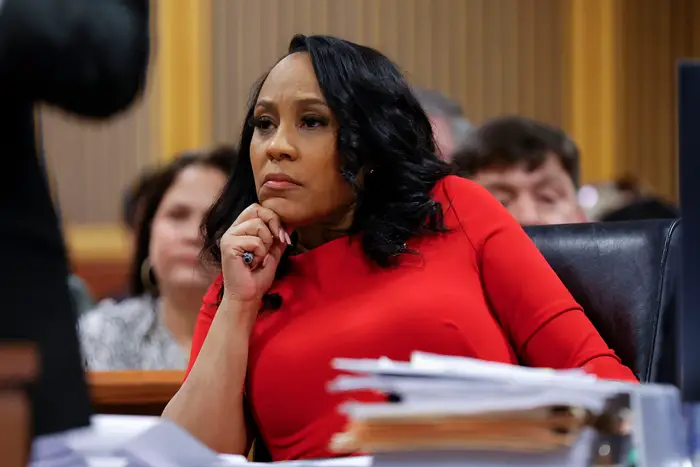The district attorney handling the election fraud case involving Donald Trump in Georgia may find herself in legal hot water this week, facing potential perjury charges.
Judge Scott McAfee anticipates delivering a verdict by the end of the week regarding Fani Willis’s involvement in the Trump trial. Allegations have surfaced suggesting a conflict of interest due to her relationship with Nathan Wade, the lead prosecutor in the case. Trump and his fellow defendants assert that Willis appointed Wade based on their personal connection.
Trump, who has entered a plea of not guilty to all 13 charges against him, has vehemently argued that the case is politically motivated, asserting his status as the frontrunner for the GOP presidential nomination.
Willis, serving as the district attorney for Fulton County, Georgia, underwent questioning last month during a two-day hearing regarding accusations of her romantic involvement with Wade. The timeline of their relationship has become a central point of contention. Trump’s legal team scrutinized phone records purporting to show the pair’s relationship predating the Georgia election fraud case.

Fani Willis (Credits: Business Insider)
Both Willis and Wade have refuted these claims under oath, asserting that their relationship commenced after the indictment of Trump and 18 others for purportedly attempting to overturn the outcome of the 2020 presidential election in Georgia.
Despite Trump’s team presenting evidence from a technical expert suggesting late-night visits by Wade to Willis’ residence long before the Trump case began, several legal experts interviewed by Newsweek expressed doubts about perjury charges being brought against Willis, even if the judge accepts that their relationship predates the indictments.
Colleen Kerwick, an attorney based in New York, explained to Newsweek that meeting Georgia’s burden of proof for perjury would pose a challenge.
“In Georgia, one can be convicted of perjury for knowingly making a materially false statement under oath. However, for a perjury conviction, there must be more than one witness. It’s doubtful there was more than one witness to her alleged affair at that time,” Kerwick stated.
Kerwick further noted that while McAfee’s hearings might cast doubt on Willis’ credibility, they might not establish a substantially different set of facts from those outlined by Willis in her testimony.
“I believe a distinction should be made between evidence that impeaches a witness, affecting the witness’s credibility, and evidence with probative force, indicating a state of facts differing from that to which the witness testified,” she added.
Greg Germain, a law professor at Syracuse University in New York, echoed the sentiment that Willis is unlikely to face perjury charges.
“Technically, anyone who testifies about anything ‘could’ face perjury charges, but such charges are quite rare. A prosecutor must demonstrate that the individual knowingly and intentionally lied, not merely that they were mistaken about timing or a similar matter,” Germain conveyed to Newsweek.
He further noted that even with compelling evidence, lying about a personal matter tangential to the case is typically not prosecuted, though exceptions exist in high-profile cases, such as the one involving Bill Clinton.
Germain emphasized that perjury charges would necessitate adjudication by a separate judge.
“Perjury proceedings would have to be initiated and adjudicated in another court. For Judge McAfee, the issue is whether to remove Fani Willis from the case due to an appearance of impropriety,” he concluded.























